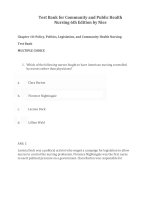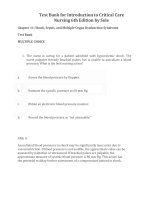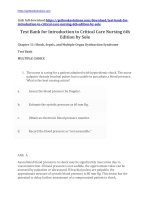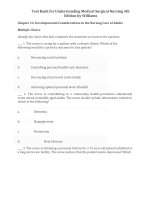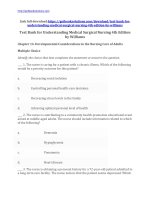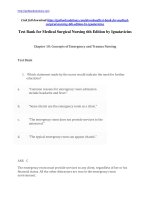Test bank for introduction to medical surgical nursing 5th edition by linton
Bạn đang xem bản rút gọn của tài liệu. Xem và tải ngay bản đầy đủ của tài liệu tại đây (185.28 KB, 12 trang )
Link download full: />Introduction to Medical-Surgical Nursing 5th Edition Study Aid – Linton
Introduction to Medical-Surgical Nursing 5th Edition Study Aid – Linton
Sample
Linton: Introduction to Medical-Surgical Nursing, 5th Edition
Chapter 11: The Older Patient
Test Bank
MULTIPLE CHOICE
1.The term old age or aged can best be defined as:
a. Person’s state of mind
b.Person older than 65 years of age
c. Process of growing older
d.Person of advanced age
ANS: D
Aged or old age is defined advanced in years.
DIF: Cognitive Level: Comprehension REF: p. 142 OBJ: 2
TOP: Definitions of Old Age KEY: Nursing Process Step: N/A
MSC:NCLEX: N/A
2.Aging is recognized by gerontologists as a developmental process that:
a. Is measured in chronologic years.
b.Is directly related to heredity.
c. Relates to behavioral characteristics.
d.Begins at the time of birth.
ANS: D
Geriatrics is the science of old age and the application of knowledge related to the
biologic, biomedical, behavioral, and social aspects of aging.
DIF: Cognitive Level: Knowledge REF: p. 142 OBJ: 2
TOP: Definitions of Old Age KEY: Nursing Process Step: N/A
MSC:NCLEX: N/A
3.Prerequisites for the nurse working with the geriatric patient include an understanding
that:
a. Specialized knowledge is needed.
b.The geriatric patient will be physically impaired.
c. Most geriatric patients will develop dementia.
d.The geriatric patient will need to be closely supervised.
ANS: A
Knowledge, understanding, and caring are prerequisites for working effectively with
older adults. Although specialized formal education programs at the graduate level are
available for gerontologic nurses, many nurses gain specials skills through on-the-job
experiences.
DIF: Cognitive Level: Comprehension REF: p. 143 OBJ: 1
TOP: Roles of the Gerontologic Nurse KEY: Nursing Process Step: N/A
MSC:NCLEX: N/A
4.A 78-year-old resident of a long-term care facility insists on wearing high heels and
miniskirts to the dining room for meals and will not leave her room without first applying
glamorous makeup. The gerontologic nurse assesses that the behavior is related to:
a. Insecurity about her appearance.
b.Trying to cope with the changes of aging.
c. Denial concerning her advancing age.
d.Her fashion consciousness.
ANS: C
Some older people confront aging, whereas others deny it by acting in a younger manner.
DIF: Cognitive Level: Analysis REF: p. 143 OBJ: 2
TOP: Ageism: Myths and Stereotypes KEY: Nursing Process Step: Assessment
MSC: NCLEX: Psychosocial Integrity: Coping and adaptation
5.According to Butler, a well-known gerontologist, ageism:
a. Dehumanizes the older individual.
b.Is based on the biologic theory of aging.
c. Is based on natural and purposeful occurrences.
d.Continues to change as the population ages.
ANS: A
Ageism is the stereotyping of and discrimination against people because of their age.
DIF: Cognitive Level: Comprehension REF: p. 143 OBJ: 2
TOP: Ageism: Myths and Stereotypes KEY: Nursing Process Step: N/A
MSC:NCLEX: N/A
6.The nurse explains that the effects of aging on the nervous system result in:
a. Accelerated loss of neurons in the brain.
b.Gradually declining loss of intellectual capability.
c. Decreased conduction speed of neurons.
d.Loss of long-term memory.
ANS: C
Age-related effects on body systems are integral parts of the basis of nursing care for the
older adult. The aging nervous system is characterized by decreased conduction speed of
neurons.
DIF: Cognitive Level: Analysis REF: p. 145 OBJ: 3
TOP: Physiologic Change KEY: Nursing Process Step: Implementation
MSC:NCLEX: Physiological Integrity: Physiological adaptation
7.The nurse includes in her approach to nursing care that older adult patients with mild
cognitive impairment (MCI) are more likely to develop:
a. Dementia, non-Alzheimer type
b.Alzheimer dementia
c. Parkinson disease
d.Psychotic disorders
ANS: B
Approximately 40% of people with MCI will develop Alzheimer dementia within 3
years.
DIF: Cognitive Level: Analysis REF: p. 146 OBJ: 3
TOP: Physiologic Change KEY: Nursing Process Step: Implementation
MSC: NCLEX: Health Promotion and Maintenance: Prevention and early detection of
disease
8.In planning activities to improve short-term memory for an older adult patient
experiencing memory deficits, the nurse would:
a. Maintain the same daily schedule.
b.Rehearse memory training.
c. Provide a varied and stimulating daily schedule.
d.Conduct deep-breathing exercises.
ANS: B
Using mnemonics and memory rehearsal may improve memory performance in some
older individuals.
DIF: Cognitive Level: Analysis REF: p. 146 OBJ: 3
TOP: Physiologic Change KEY: Nursing Process Step: Planning
MSC:NCLEX: Physiological Integrity: Physiological adaptation
9.The nurse reassures a patient who is worried about memory loss by using an example of
normal memory change or lapse of memory such as:
a. Relying on another person to remember names or important events
b.Occasional forgetfulness or inability to recall names or facts
c. Difficulty in recalling recent events
d.Difficulty in recalling past events
ANS: B
Memory lapses such as forgetting a name or misplacing an item are common, normal
memory changes.
DIF: Cognitive Level: Analysis REF: p. 146 OBJ: 3
TOP: Physiologic Change KEY: Nursing Process Step: Implementation
MSC:NCLEX: Psychosocial Integrity: Psychosocial adaptation
10.For most older adults, facts are that are generally accepted include:
a. Intellectual capabilities are impaired.
b.Functional brain activities decrease.
c. Functional intellectual capability is maintained.
d.Creativity and judgment are severely impaired.
ANS: C
Functional ability may not be significantly affected because reserve cells are able to
compensate.
DIF: Cognitive Level: Analysis REF: p. 145 OBJ: 3
TOP: Physiologic Change KEY: Nursing Process Step: N/A
MSC:NCLEX: N/A
11.The nurse in a long-term care facility takes extra precaution in the approach to nursing
care because the older adult is more prone to respiratory infection because of:
a. Decreased ciliary action
b.Decreased physical activity
c. Inadequate hydration
d.Poor personal hygiene
ANS: A
The ability to perform strenuous work decreases with age. The ciliary action responsible
for movement of secretions from the lung is compromised because of epithelial atrophy.
DIF: Cognitive Level: Analysis REF: p. 146 OBJ: 3
TOP: Physiologic Change KEY: Nursing Process Step: Planning
MSC: NCLEX: Health Promotion and Maintenance: Prevention and early detection of
disease
12.The nurse is aware that an older person whose renal changes make it impossible to
concentrate or dilute urine is at risk for:
a. Urinary infection
b.Dehydration
c. Incontinence
d.Renal failure
ANS: B
The kidney’s ability to concentrate urine is a major defense against dehydration.
DIF: Cognitive Level: Analysis REF: p. 147 OBJ: 3
TOP: Physiologic Renal Change KEY: Nursing Process Step: Planning
MSC:NCLEX: Physiological Integrity: Physiological adaptation
13.Considering the gastrointestinal (GI) changes that take place in the geriatric patient,
the assessment with the greatest priority to report is:
a. 24-hour urinary output of 1450 ml
b.24-hour dietary intake of 75% of meals
c. Last bowel movement 4 days ago
d.Weight loss of 2 pounds since admission 2 months ago
ANS: C
GI changes include bloating, diarrhea, pernicious anemia, and constipation.
DIF: Cognitive Level: Analysis REF: p. 148 OBJ: 3
TOP: Physiologic Change KEY: Nursing Process Step: Assessment
MSC: NCLEX: Health Promotion and Maintenance: Prevention and early detection of
disease
14.The nurse assesses a major sign of renal changes related to age, which is:
a. Hematuria
b.Nocturia
c. Urgency incontinence
d.Renal calculi
ANS: C
Urgency incontinence is related to several age-related changes in the urinary musculature.
Renal calculi and hematuria are pathologic symptoms and are not age-related. Nocturia is
not specifically related to aging.
DIF: Cognitive Level: Knowledge REF: p. 153 OBJ: 3
TOP: Physiologic Change KEY: Nursing Process Step: Assessment
MSC:NCLEX: Physiological Integrity: Physiological adaptation
15.When gathering data concerning the musculoskeletal system, the most significant
assessment would be:
a. Slow gait
b.Degree of motion of all joints
c. Enlarged joints
d.Crepitus in joints
ANS: B
Determine mobility by assessing the range of motion in all joints; in addition, look for
signs of inflammation and pain associated with mobility.
DIF: Cognitive Level: Analysis REF: p. 148 OBJ: 3
TOP: Physiologic Change KEY: Nursing Process Step: Assessment
MSC: NCLEX: Health Promotion and Maintenance: Prevention and early detection of
disease
16.The nursing interventions appropriate for the patient with presbycusis would be:
a. Speak clearly and distinctly while facing the patient.
b.Announce your presence when entering the patient’s room.
c. Place needed articles within easy reach.
d.Orient the patient to time and place as needed.
ANS: A
Presbycusis is hearing loss. Get the patient’s attention so that the patient can concentrate
on what you are saying or read lips.
DIF: Cognitive Level: Analysis REF: p. 149 OBJ: 3
TOP: Physiologic Change KEY: Nursing Process Step: Implementation
MSC: NCLEX: Physiological Integrity: Basic care and comfort
17.When the patient holds his Bible 6 inches from his face and turns his head to read out
of the corner of his eyes, the nurse suspects that the patient is developing:
a. Cataracts
b.Glaucoma
c. Presbyopia
d.Macular degeneration
ANS: D
The leading cause of new blindness in old age is macular degeneration, which results in
the loss of central vision.
DIF: Cognitive Level: Analysis REF: p. 149 OBJ: 3
TOP: Macular Degeneration KEY: Nursing Process Step: Assessment
MSC:NCLEX: Physiological Integrity: Physiological adaptation
18.Chemosensory changes that are observed in the older adult:
a. Are directly related to the aging process.
b.Are most often caused by disease.
c. Begin in the fifth decade of life.
d.Affect more women than men.
ANS: B
Major changes in the ability to taste are often caused by disease or a side effect of certain
drugs.
DIF: Cognitive Level: Analysis REF: p. 149 OBJ: 3
TOP: Chemosensory Change KEY: Nursing Process Step: N/A
MSC:NCLEX: N/A
19.The nurse cautions family members that the final developmental stage is ego integrity.
According to Erikson, if this stage is not mastered, the older adult will:
a. Have to repeat a previous stage.
b.Experience despair.
c. Be unable to advance past his or her present stage.
d.Experience disappointment.
ANS: B
The final developmental task is ego versus despair. This negative resolution is often seen
as depression and social withdrawal.
DIF: Cognitive Level: Comprehension REF: p. 150 OBJ: 3
TOP: Psychosocial Factors KEY: Nursing Process Step: Implementation
MSC: NCLEX: Health Promotion and Maintenance: Growth and development
20.To relieve the discomfort of pruritus related to dry skin, the nurse should focus on:
a. Encourage the patient to talk to the primary care physician about the problem.
b.Encourage the patient to take a tepid bath and use moisturizers.
c. Teach the patient that pruritus is an expected consequence of aging.
d.Establishing a medication regimen to control the discomfort.
ANS: B
Because pruritus is caused by loss of oils in the skin, the patient should be encouraged to
take tepid baths, use moisturizers, and avoid overuse of antiperspirants, soaps, perfumes,
and long hot baths.
DIF: Cognitive Level: Analysis REF: p. 147 OBJ: 3
TOP: Physiologic Change KEY: Nursing Process Step: Implementation
MSC: NCLEX: Physiological Integrity: Basic care and comfort
21.A new 72-year-old resident of a long-term care facility naps frequently during the day,
stating that he is tired. The nurse should:
a. Obtain an order from the primary caregiver for a sedative.
b.Ask the patient if he is sleeping well at night.
c. Plan activities to keep the patient awake during the day.
d.Tell the patient that he cannot take any more naps.
ANS: B
Determining if or the reason why the patient is not sleeping at night will help the nurse
implement the appropriate nursing actions. Depression may be interfering with adapting
to the long-term facility.
DIF: Cognitive Level: Analysis REF: p. 151 OBJ: 4
TOP: Psychosocial Factors KEY: Nursing Process Step: Implementation
MSC: NCLEX: Health Promotion and Maintenance
22.The nurse is aware that drug toxicity can occur as a result of an age-related change in
the liver, which is:
a. Increased liver size
b.Decreased liver enzyme activity
c. Rapid blood flow through the liver
d.Fluid accumulation in the portal vein
ANS: B
Decreased liver enzyme activity does not prepare the drug for excretion. The liver size is
decreased in older persons; blood flow through the liver is also decreased.
DIF: Cognitive Level: Analysis REF: p. 153 OBJ: 3
TOP: Decreased Liver Function KEY: Nursing Process Step: Planning
MSC:NCLEX: Physiological Integrity: Physiological adaptation
23.A 77-year-old recently admitted to a long-term care facility refuses to join in activities
or go to the dining room for meals. This behavior may indicate that the patient is:
a. Stubborn
b.Depressed
c. Afraid
d.Tired
ANS: B
Some older people respond to loss by losing their sense of personal identity and
fulfillment. They suffer from deterioration in self-esteem and become depressed.
DIF: Cognitive Level: Analysis REF: p. 151 OBJ: 5
TOP: Psychosocial Factors KEY: Nursing Process Step: Assessment
MSC:NCLEX: Psychosocial Integrity: Physiological adaptation
MULTIPLE RESPONSE
1.The error theories of aging are all based on the following concepts: (Select all that
apply.)
a. Rate of aging is related to the rate of living.
b.Aging is a result of purposeful events governed by genetic structure.
c. External events cause damage to cells.
d.The organism becomes immune to the body’s restorative processes.
e. Cumulative damage causes organ malfunction.
ANS: A, C, E
Aging is a result of progressive damage to cells, which results in organ failure or error.
DIF: Cognitive Level: Analysis REF: p. 145 OBJ: 3
TOP: Aging Theories KEY: Nursing Process Step: N/A
MSC:NCLEX: N/A
2.The nurse assesses age-related cardiovascular changes that include: (Select all that
apply.)
a. Cardiac murmurs
b.Widened pulse pressure
c. Pulse decreasing in force
d.Dyspnea
e. Chest pain
ANS: A, B, C
Murmurs, widening pulse pressure, and decreasing force of pulse are all associated with
age-related changes. Dyspnea and chest pain are not anticipated changes in the
cardiovascular system.


